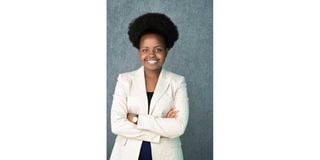The rise and rise of young women to student leadership

Ms Karen Cheptoo Birech, the new president of Kabarak University Students Organisation (Kuso).
What you need to know:
- Karen Birech of Kabarak University is the latest to headline the story of women student leaders; the Third-Year law student was sworn in last week
- Cabinet Secretary for Sports Ababu Namwamba and former Chief Justice Willy Mutunga, were among top lawyers who celebrated her win on Twitter shortly after she was declared the president-elect.
The number of women at the helm of student bodies in the institutions of higher learning is steadily rising.
Karen Cheptoo Birech’s name is the latest to be added onto the list of women leaders of university student organisations. The Third Year law student was sworn in on Wednesday last week, to lead Kabarak University Students’ Organisation (Kuso).
Ms Birech was declared winner on February 7, after beating her closest challenger by a comfortable margin.
“In my campaigns, I neither used extraordinary tricks nor political slogans. I approached everyone with humility and the principle of servant leadership. I faced a few challenges like stereotyping for being female,” she says.
Cabinet Secretary for Sports Ababu Namwamba and former Chief Justice Willy Mutunga, were among top lawyers who celebrated her win on Twitter shortly after she was declared the president-elect.
She now joins the likes of Melvine Thogo, the chairperson of the University of Nairobi Students’ Association (UNSA). Ms Thogo, whose one-year term is ending next month, has been leading a seven-member UNSA council since March last year.
The council consists of three other female leaders: Valentine Mwende (treasurer), Maryl Aluodo (sports and social welfare rep) and Monica Malith (international students’ representative). According to the amended UNSA constitution, the council must meet the third gender rule.
Ms Thogo, now a Fourth Year law student, is the second female chairperson of the University of Nairobi student’s body after Ms Anne Mvurya, who served between 2019 and 2020.
Ms Birech is the third female chairperson of Kuso. She is picking up the baton from Lorraine Chemutai Koskei, whose leadership was credited for organising leadership forums for female students and carrying out a number of research programmes at the Kabarak Law School.
The first female chairperson of Kuso was Rose Awuor, who helmed it in 2019-20 when Ms Birech was in her First Year.
She is leading a 15-member Kuso council, including Sylvia Gati, the director of Social Affairs who also serves as treasurer in the executive. She says her leadership skills were honed at a tender age.
“In primary school – Bishop Muge Memorial School and Mosop Glory Academy – I was a class monitor. At Gishu High School, I served as deputy school captain and later captain,” she says.
“I had never imagined that it was God preparing me to be the president of Kabarak University. Most of my childhood was spent in church, the Seventh Day Adventist Church. It’s there that I learnt humility and servant leadership.”
She says her love for reading newspaper articles and books written by great women like Nobel Peace Prize laureate Wangari Maathai, Michelle Obama and Margaret Thatcher, impacted her life.
“I remember reading about Margaret Thatcher, the former British Prime Minister, out of sheer curiosity and how she developed her confidence the hard way. She rose above the prejudice around her becoming a university professor at age 26, a senior white house advisor at age 34, provost of Stanford University at 38 as she rose above the ranks. I wanted to be like her,” she says.
“It is from reading newspapers and watching Fatou Bensouda, the former prosecutor at the International Criminal Court, that the idea of joining law school was hatched.”
Ms Birech says her current position is preparing her for bigger things at the national stage.
“I would like to represent the interests of the girl child, the youth and women generally in the National Assembly. Probably, later I can go for the big seat—Kenya’s presidency,” she says.
“But before that, I would like to work as a human rights lawyer, focusing on inclusion of marginalised persons and communities. It is my dream that one day, they shall be afforded meaningful representation.”
In her manifesto, Ms Birech promised to fight for the welfare of students, ensure accountability and build robust relationships between the university and the students.
“I will ensure my office is accountable. I believe any officer who is elected must be accountable to the students that put them in office. All students want a university where student officials and their decisions are held to account. That’s why I’m committing to a more transparent union,” she says.





